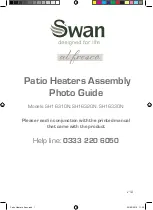
6
12. FUNCTIONAL DEFECTS
Defect
Failure
1. Water in the tank is cold
LED is on
Heating element failure
2. Water in the tank is not warm enough
LED is on
Heating element failure
3. Water in the tank is cold
LED is not
on
thermostat failure – the safety fuse turned off
electricity supply
power supply outside the heater discontinued
4. Water in the tank does not correspond with
temperature set
LED is on
thermostat failure
Do not try to repair the failure yourselves. Seek either expert or service help. It does not take much for an expert to
remove the defect. When making a repair appointment, report the type and serial number you find on the performance
plate of your water heater.
13.
FIRE-FIGHTING REGULATIONS FOR INSTALLATION AND USE OF
HEATER
We would like to emphasise that the heater must not be connected to power supply if work involving flammable
liquids (petrol, spot remover) or gases, etc., is performed nearby.
14. HEATER CLEANING AND ANODE ROD EXCHANGE
Repetitive water heating causes limestone sediment on both the enamelled tank walls and chiefly the flange lid.
The sedimentation depends on the hardness of water heated, its temperature, and amount of hot water consumed.
We recommend checking and cleaning the tank from scale and eventual replacement of the anode rod after
two years of operation.
The anode life is theoretically calculated for two years of operation; however, it changes with
water hardness and chemical composition in the place of use. Based on such an inspection, the next term of anode rod
exchange may be determined. Have the company in charge of service affairs clean and exchange the anode. When
draining water from the heater, the combination faucet valve for hot water must be open, preventing occurrence of under-
pressure in the heater tank which would stop the water from draining.
15. INSTALLATION REGULATIONS
Regulations and instructions that must be obeyed if the heater is connected
a)
to the electrical network
ČSN 33 2180 - Connecting of electric devices and appliances
ČSN 33 2000-4-41 - Low voltage electric installations Protective measures to ensure safety – Protection against
electric shock
ČSN 33 2000-5-51 - Electric installations of buildings
ČSN 33 2000-7-701 - Low voltage electric installations Single-purpose devices and devices in special premises -
Premises with tub or shower to hot service water heating system
b)
to the hot water heating system
ČSN 06 0320 - Thermal systems in buildings - Hot water preparation – Design and Project Engineering
ČSN 06 0830 – Thermal systems in buildings – Protecting devices
ČSN 73 6660 – Internal water conduits
ČSN 07 7401 - Water and steam for thermal energy equipments with working steam pressure up to 8 MPa
ČSN 06 1010 - Tank water heaters with water and steam heating; and combined with electric heating Technical
requirements. Testing.
Both electric and water installation must follow and meet requirements and regulations relevant in the
country of use.
Содержание TO-20
Страница 7: ...7 Thermostat knob Fig 2 Fig 3 Fig 1...
Страница 8: ...8 05 2012 Fig 4...


























